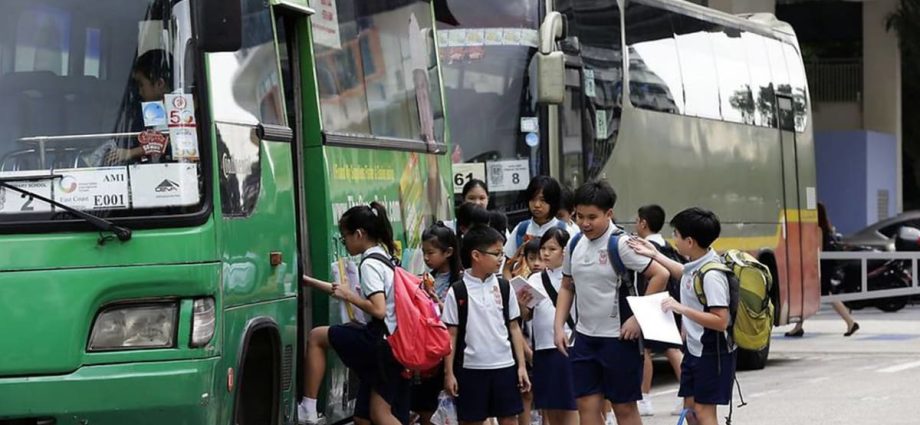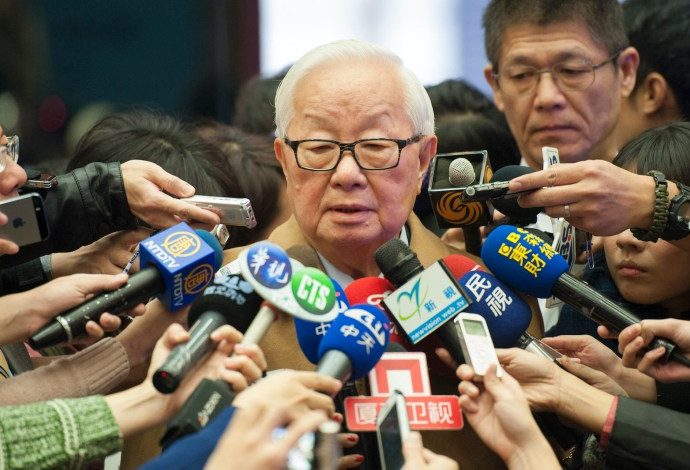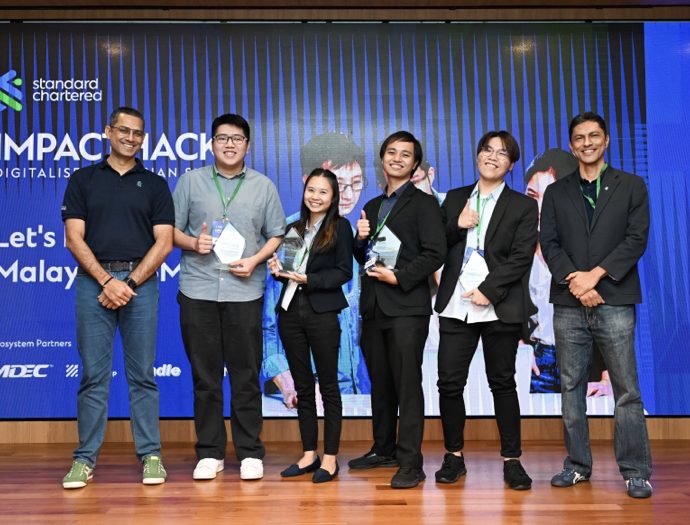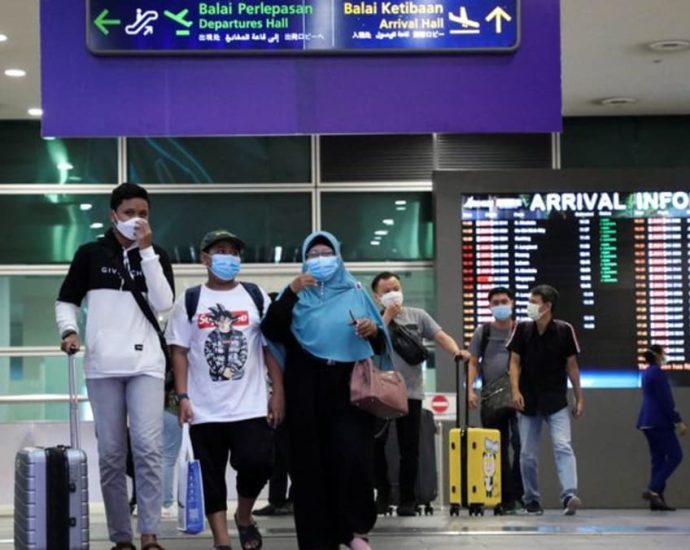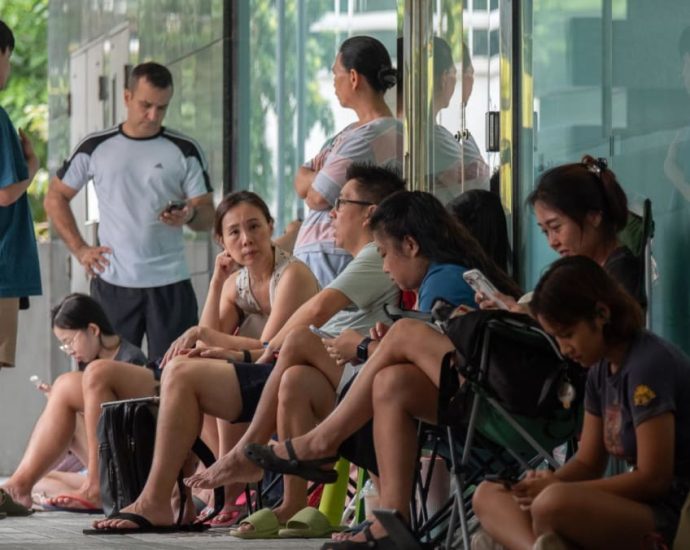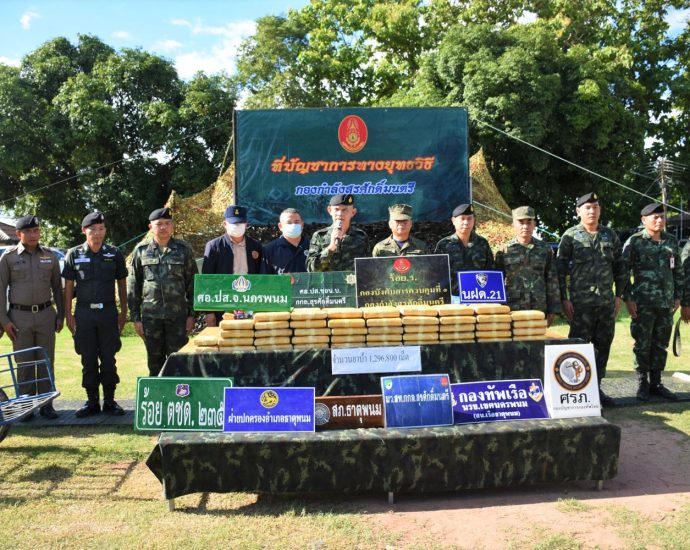CNA Explains: The challenges school bus operators face and why they need parents to pay more
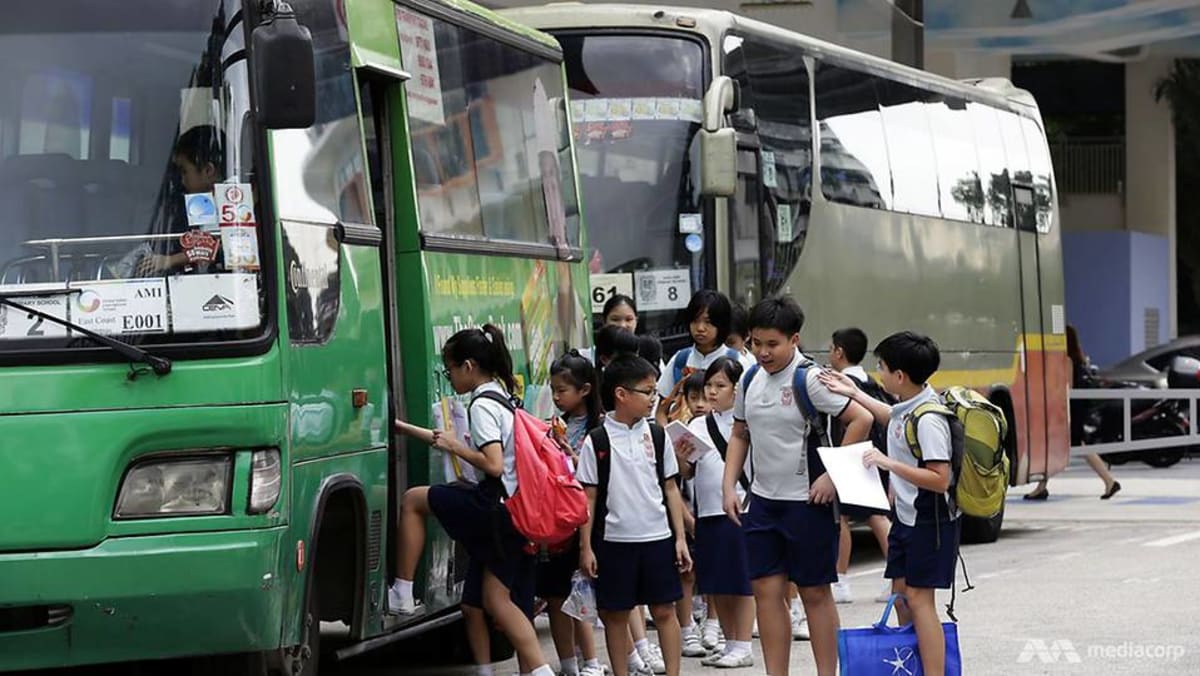
LACK OF DEMAND, HIGH COSTS
The costs of running a bus service are high, and providing school bus services rarely covers them, said the industry players.
It is the supplementary income from transporting workers and tourists that keeps the school bus business “viable”, said Mr Adrian Yeap, CEO of bus company Yeap Transport.
“No school bus operator can survive on just school bus fare in Singapore,” he told CNA’s podcast Heart of The Matter.
Previously, school bus operators had pupils in the morning session and the afternoon session to cater to, but things changed after the move to a single session in 2000.
“The price did not catch up,” said Mr Yeap.
For instance, if it costs S$100 a day to run the service today, what he may earn from three trips may be S$30, he said.
To earn the remaining money just to break even, he will have to drive more, he noted.
“How many more hours do you want the school bus driver who’s responsible for the very life of your children at the back to drive?” he asked.
“The poor bus driver has to drive many hours in order to make ends meet,” he added.
EXPECTATIONS OF LOW FEES
The industry is also limited by parents’ perceptions on how much school bus services are worth, bus owners said.
“A lot of the parents have a mindset that they are willing to pay this much,” said Mr Darry Lim, spokesman from the Singapore School Transport Association.
Parents of children in local primary schools currently typically pay between S$110 and S$180 per month for nine months, he told Heart of The Matter.
Will Bidenâs âMade in Americaâ policy work?
“A nation can be transformed.” With those stately words, US President Joe Biden signed the Inflation Reduction Act (IRA) into law in August 2022.
Despite the fractured state of US partisan politics, the Democratic Party guided the largest energy subsidy in US history into being with a new national ethos for greening the economy while tilting global competition in the United States’ favor.
The IRA is part of a broader policy agenda with the CHIPS and Science Act that provides US$280 billion in federal funding for research and the fabrication of logic and memory chips inside the United States.
The Infrastructure Investment and Jobs Act also funneled $700 billion into electrification, renewable energy and digital infrastructure and has already funded 20,000 projects since 2021.
Understandably, there is some consternation over the market-distorting effects of Washington offering Beijing-style direct subsidies for those willing to bet on the Democrats’ “Make it in America” agenda.
While governments with cash to spend – like members of the European Union – have pledged their own net-zero industrial plans and chips subsidies, Asian leaders, like Indonesian President Joko Widodo, have hinted at trade remedies to protect Asia’s budding electric vehicle (EV) industry against unfair market practices abroad.
US industrial policy is not just transformative for the United States, but also for Asia, and intentionally so. The United States will subsidize hydrogen investments twice over: first for its production and again when it is used by energy-intensive industries across Asia, such as steel, aluminum, chemicals and heavy manufacturing.
Such double-sided stimuli will change the parity of competition against China and with allies and net importers of energy like India, Japan, South Korea and Vietnam. Carbon levies, currently under consideration, will also hamper exports from countries like Malaysia or Indonesia.
These subsidies also have some broader macro effects on Asia. While Trump-era tariffs created little or no jobs at home, the 2017 US tax reforms incentivized US multinationals to repatriate trillions from East Asia back into the domestic economy.

The IRA will funnel these profits into investments rather than shareholder dividends. The United States is already the largest recipient of foreign investments – thanks to its position as the world’s most productive economy by some margin – and the IRA will divert more capital from East Asia into the United States.
But the Biden administration’s industrial policy trifecta is not just an innovation moonshot of the 1960s. There is also an ideological shift – which National Security Adviser Jake Sullivan describes as the “new Washington consensus” – from a productivity-driven economic policy towards a statecraft-led one that aims to secure a comfortable lead over any rival on emerging technologies.
If US sanctions are designed to stop China from ever landing on the Sea of Tranquillity, the subsidies are the flipside of the same coin.
But today’s geostrategic competition is also a challenge different from that of the Cold War. Unlike the Soviet Union, China is deeply integrated into global production networks with well-diversified fiscal revenue. The United States would never be able to outspend it.
Nor is China the only rival. The puzzlement over whether electric vehicles from US allies – but commercial rivals – like Japan or Germany qualified for IRA tax credits showed how distinguishing allies and adversaries is a second-order priority for US legislators.
Other subsidies favor 5G equipment from a private consortium led by US cloud companies and Chinese military contractors – such as ZTE, Inspur, Phytium and H3C – over trusted South Korean and Nordic manufacturers like Samsung, Ericsson and Nokia.
But perhaps the most conspicuous plans pertain to moving the manufacturing of high-end processors and dynamic random-access memory chips to the United States.
The market leader, Taiwan Semiconductor Manufacturing Company (TSMC), estimates that the construction costs are likely to be at least four times higher than they would be in Taiwan due to skill shortages and administrative red tape. Its CEO, Morris Chang, candidly called the US effort to bring chipmaking home an “exercise in futility.”
Absent of commercial logic, such endeavors seem eerily similar to Beijing’s attempt at forced technology transfer, especially in light of US export controls towards South Korean and Taiwanese-owned microchip manufacturing plants in China.
Given such negative outlooks and global ramifications, it is an open question whether Biden’s gamble will pay off.
Many economists are negatively disposed to US industrial policy as markets inevitably make better informed and diversified bets on future technologies than government officials.
Postwar activist policies in Japan, South Korea and Taiwan were successful because they redirected scarce resources into sectors that held more long-term promise. They then ceased to be productive once the countries matured into dynamic market economies.

East Asian countries could shield their ministries from lawmakers and lobbyists representing special interests. Elsewhere, industrial policy is prone to failure in stakeholder systems like the United States or China, where lobbying has been elevated to performance art.
Auto bailouts, Cray supercomputers, solar panels and attempts to synthesize fuel from coal failed because the government supported unviable ideas or companies that were politically well-connected.
In contrast, innovations often labeled as successful – from the early breakthrough in semiconductor technology in the 1960s to Covid-19 vaccines – were not thanks to the White House betting on the right technology or company, but the results of broader support for scientific research.
In the coming decade, the United States will spend $100 billion annually on industrial support, a sum larger than the entire government expenditure of Singapore. While many programs will fail, a few projects may prolong US industrial pre-eminence, especially if the incentives are carefully designed to exploit Asia and Europe’s struggle with higher energy prices.
As Samuel Huntington said of the United States’ relative industrial decline against Japan back in 1988, “The United States is unlikely to decline so long as its public is periodically convinced that it is about to decline.”
Such aversion to defeatism – real or imagined – is indispensable in mobilizing the nation into something previously unthinkable, or even slightly un-American, like industrial policy.
Hosuk Lee-Makiyama is Director of the European Centre for International Political Economy and Senior Fellow of the Singapore Institute of International Affairs.
This article was originally published by East Asia Forum and is republished under a Creative Commons license.
PUBG: India-Pakistan gaming love story ends in jail

The love story of a Pakistani woman and an Indian man who met through popular online game PUBG has been making headlines in India after the couple landed up in jail.
Seema Ghulam Haider, 27, met Sachin Meena, 22, through the virtual gaming platform a couple of years ago and recently travelled to India so that she could live with him.
She entered India illegally in May along with her four young children and they were staying with Mr Meena in Greater Noida – a city in the northern state of Uttar Pradesh – for over a month, police said.
On Tuesday, the couple was arrested. A court has remanded them in jail for 14 days. The woman’s children are with their mother. The couple have told reporters that they want to get married and live together. Police say they are carrying out a detailed investigation into the case.
The India-Pakistan love story has sparked conversations around the role the virtual world plays in fostering real-life relationships across geographical borders.
Sparks fly on PUBG
Ms Haider married Ghulam Haider, a resident of Pakistan’s Sindh province, in February 2014. The couple had four children – three daughters and a son – together.
Five years after their marriage, her husband moved to Saudi Arabia for work. Ms Haider began playing PUBG to keep herself occupied.
“I used to play PUBG for two to three hours a day and I got to know Sachin while playing the game,” she told BBC Hindi. The two exchanged phone numbers and began speaking regularly.
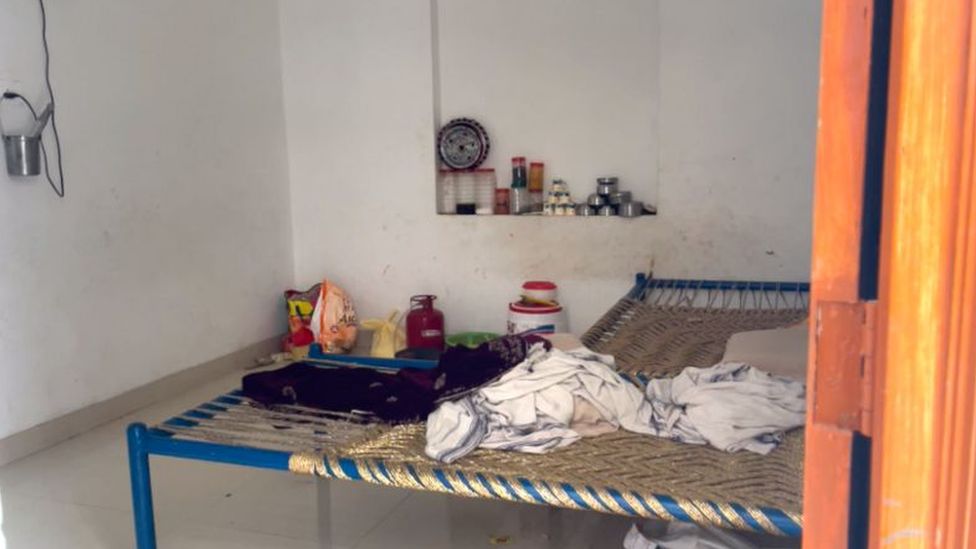
After their relationship had progressed over three years, Ms Haider decided to move to India to marry Mr Meena.
She has accused her husband of beating her and has told police that she had divorced him. Mr Haider has denied the domestic violence allegations and the divorce.
He has accused Ms Haider of selling their house in Pakistan and running away with their children and jewellery.
How the couple met
Police said that Ms Haider and Mr Meena first met in Nepal in March and stayed in a hotel for a couple of days before they returned to their respective countries.
In May, Ms Haider travelled to Nepal again on a tourist visa, this time with her four children. From there she took a bus to Delhi, senior police official in Greater Noida Saad Miya Khan told the BBC.
Police said she told them that she did not sell her husband’s house but a plot of land that belonged to her parents to gather money for the trip and got the idea of entering India via Nepal from a YouTube video.
Mr Meena, who lives in Rabupura town in Greater Noida and works in a grocery shop, rented a room to stay with Ms Haider and her children.
His landlord, Girish Kumar, told the BBC that he never suspected anything illegal as Mr Meena had provided necessary government documents while renting the house and that his parents too had come to visit the couple.
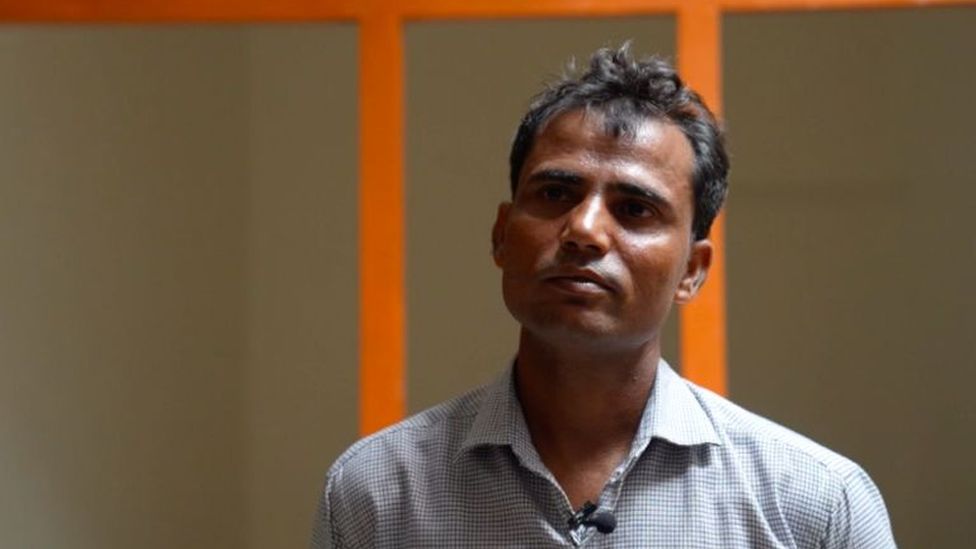
How they got caught
The couple reportedly met a local lawyer for advice about Ms Haider’s residency in India last week but the lawyer informed the police about them, Times of India newspaper reported.
“I was startled when I found that she and her children were carrying Pakistani passports,” the lawyer told the newspaper, and added that Ms Haider was making inquiries about the process of getting married in India.
The lawyer claimed that Ms Haider had said that her husband [Ghulam Haider] would physically assault her and that she had not met him in four years.
He also claimed that Ms Haider got up and left as soon as she was asked about her Indian visa and that one of his associates then followed her.
“When I learnt that they were living in Rabupura, I informed the police,” the lawyer said.
Along with the couple, the police have arrested Mr Meena’s father as well for sheltering Ms Haider without a visa.
The couple have appealed to the Indian government to help them get married.
Ms Haider’s husband, meanwhile, claims that his wife has been “seduced” through PUBG and wants her to be returned to Pakistan with their children.
Additional reporting by Riyaz Sohail and Shumaila Khan
BBC News India is now on YouTube. Click here to subscribe and watch our documentaries, explainers and features.

Read more India stories from the BBC:

-
-
17 August 2022

-
Rubbish-clearing divers come to rescue of ‘pearl of Kyrgyzstan’
ISSYK KUL LAKE: On the shores of Lake Issyk Kul in mountainous Kyrgyzstan, a group of divers show off their haul for the day – a boat engine, car tyres, bottles, clothes and plastic items. “We would love to dive and not find any waste,” said Anvar Shamsutdinov, the moustachioedContinue Reading
Team DoBetter wins the first ImpactHack 2023 Hackathon by Standard Chartered
The team walked away with US$6,444, trophies, and certificates
of the 100 teams that participated, 10 were chosen for the final presentatio
Team DoBetter took home US$6,444 (MYR30,000) well as trophies and certificates as the champion at ImpactHack 2023 Hackathon by Standard Chartered. The team won for their prototype solution BizFlow, a centralised…Continue Reading
KL airport incident: Malaysia introduces measures to prevent immigration abuses at entry points
KUALA LUMPUR: Malaysia’s Home Minister Saifuddin Nasution Ismail announced a slate of new measures that will be introduced at the country’s entry points following an incident of alleged corruption towards a Chinese traveller at the Kuala Lumpur International Airport (KLIA). From now, only senior officers of the Immigration Department whoContinue Reading
Taylor Swift fans start queuing at SingPost outlets more than 24 hours before general ticket sales start
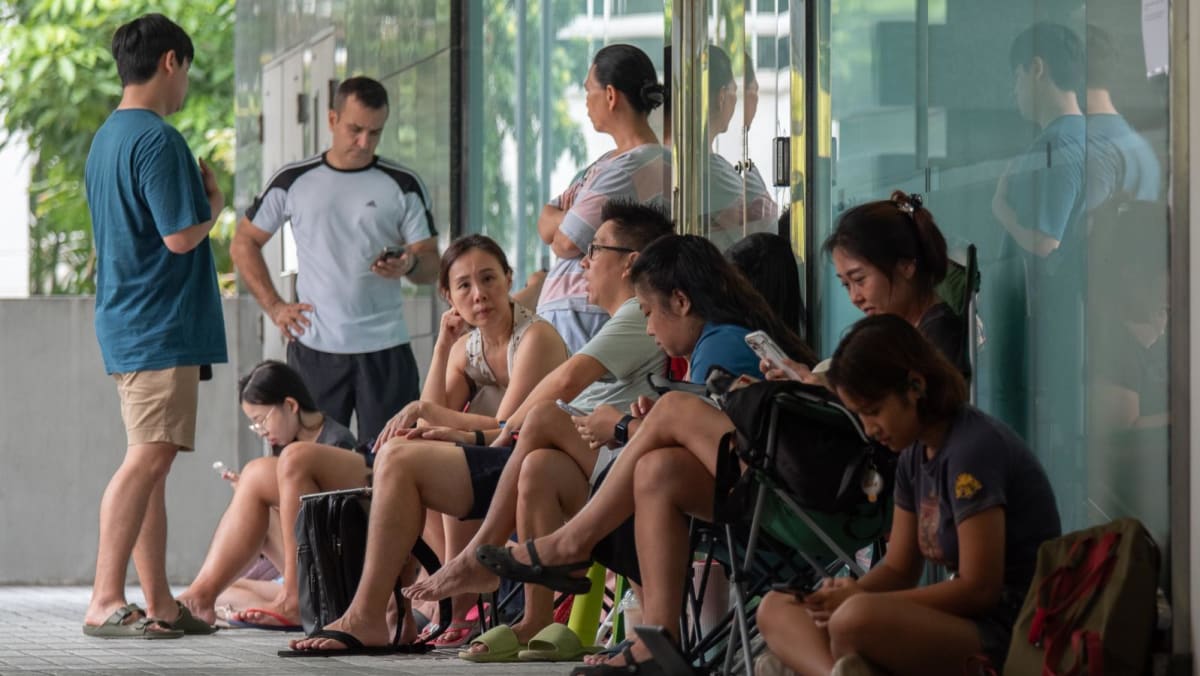
That “somebody” is Simone, an 18-year-old student at Nanyang Polytechnic. Like Catalina, Simone arrived at around 9am on Thursday. However, she was slightly ahead and ended up being the first person in line, that is, the person with a very high chance of scoring general sales tickets on Friday.
Despite the power she wields, Simone plans to only purchase Category 4 or 5 tickets (which cost S$248 and S$168, respectively) for just one show, citing budget issues. Like June, Simone opted to queue physically as “there were a lot of system crashes due to overload” and “there was a better chance of getting tickets (via SingPost) based on personal experience”.
Within hours of queuing, Simone had already formed a friendship with Catalina and June – the two women even helped watch over her spot as she went to have lunch with her mother. Swifties stick together, clearly.
Those trying to buy tickets on Friday have already cleared one hurdle – they are the lucky ones who have received a unique access code to participate in general sales, both online and offline. Some others have been put on a waitlist and will only be given codes should there be enough seats available.
With close to 24 hours till the start of general sales, how are these fans passing the time and staying fearless?
“Chit-chat, watch some K-dramas and read books,” said June.
Given the influx of high-profile concerts held in Singapore in the coming months, such as Twice and Coldplay, more and more fans are turning to SingPost outlets to secure their tickets. Yet, some netizens feel like the act of queuing overnight outside a post office borders on “excessive”. What do these fans have to say about that?
Catalina quipped: “It’s not excessive as we like (Swift’s) songs and we like her. That’s why we think it’s worth queuing up. We just buy enough for our own use and not for resale.”
Simone echoed her sentiments, saying: “It isn’t obsessive and I shouldn’t risk anything (for this concert). If you want something and are passionate about it, you should do all you can to get it.”
In any case, time will soon tell whether the efforts of these fans will be worth it.
Coco Lee: The pioneering singer who charmed the world
 Getty Images
Getty ImagesMillions of Asians tuned in on their television and mobile screens on what a Monday in March 2001 to watch Coco Lee sing A Love Before Time – the stirring theme from the acclaimed film Crouching Tiger, Hidden Dragon – at the 73rd Academy Awards.
Donning a red qipao, a traditional Chinese outfit, and golden chandelier earrings, Lee sang alongside a group of kungfu dancers, becoming the first Chinese-American to perform at the Oscars. The song was also nominated for best original song that year.
The then 26-year-old spoke of her ambition to leave an Asian footprint, literally, on the international stage. “I could sing for 30 years and never get the chance to perform like this,” Lee had said of the ground-breaking performance.
Lee died in Hong Kong on Wednesday at the age of 48. Her sisters, who broke the news on social media, said she had been suffering from depression for a few years and tried to take her own life on Sunday.
Long before representation became a talking point in entertainment, Lee became one of the first Asian singers to shoot to fame on both sides of the Pacific.
Born Ferren Lee on January 17, 1975, in Hong Kong, she moved to the US with her family when she was a secondary school student. After graduating from a public high school in California, she returned to Hong Kong, and then moved to Taiwan to launch her singing career. She soon broke into the Mandopop scene in 1994 with two albums.
Within a few years, she released English-language albums and crossed over to American charts. Disney hired her to voice the lead character in the Mandarin version of its hit film Mulan, for which she also sang the theme song, Reflection.
Her hit Before I Fall in Love made it to the soundtrack of the Julia Roberts-and-Richard Gere film Runaway Bride; and Do You Want My Love soared to the fourth spot on the US Billboard in 2000.

Lee will be remembered for “laying the groundwork, culturally and musically,” in bridging the gap between East Asian and Western audiences, entertainment blogger Brandon Lewis told the BBC. Some fans likened her to Mariah Carey.
She holds a special spot among Chinese millennials who grew up listening to her music in Mandarin and English. It was a time when Mandopop flourished as economies like China, Taiwan, Hong Kong and Singapore boomed. Amid a sea of demure female singers crooning ballads, Li Wen – as she is known in the Chinese-speaking world – stood out with her confident image, sexy dance moves and brightly-coloured locks.
One of her songs Di Da Di, a Chinese cover of a Danish pop song, became an instant hit and a karaoke staple after it appeared in an advertisement in mainland China.
Behind the fame and flamboyance, Lee remained close with her mother and sisters.
In the early years of her career, her sister Nancy served as Lee’s wardrobe consultant, public relations officer and makeup artist – including on Oscar night – while her mother was manager and accountant. It was in fact Nancy who suggested the moniker Coco.
As a child, Lee had wanted to follow in her mother’s footsteps to become a doctor. She initially tried to juggle singing with pre-medical studies in university, but eventually left school to focus on her pop career.
In an Instagram post on Wednesday, Lee’s sisters Carol and Nancy spoke poignantly of how their younger sister “worked tirelessly to open up a new world for Chinese singers in the international music scene”.

“She went all out to shine for the Chinese. We are proud of her,” they wrote.
Lee’s death came as a shock to fans and fellow artistes who remember her for her shiny smile and exuberance on stage. Inevitably, it sparked a discussion about mental health on social media.
Crouching Tiger, Hidden Dragon director Ang Lee said he was “very shocked” to hear the news, and star Jackie Chan said Lee had “such great talent and unique personal style” and was “born to be a star”. “There will be one more star in the sky from now on,” he added.
On YouTube, where fans are re-watching Lee’s music videos and leaving tributes, one comment read: “I hope Li Wen can continue singing up in heaven, far away from pain and illness. Your song will forever live in our hearts.”
Related Topics
-
-
14 hours ago

-
Vietnam probes Blackpink concert organiser over South China Sea map
HANOI: Vietnam has launched an inspection into K-pop group Blackpink’s tour organiser’s website, ahead of its concert in Hanoi, over criticism from fans that it shows a map of the South China Sea with disputed boundaries. The controversy follows Vietnam’s decision to ban Warner Bros’ highly-anticipated film “Barbie” over aContinue Reading
Fleeing smugglers abandon 1.3m speed pills
Suspects left drugs on bank of Mekong in Nakhon Phanom before fleeing in boat

Authorities have seized nearly 1.3 million speed pills abandoned by fleeing smugglers on the bank of the Mekong River in That Phanom district of Nakhon Phanom province.
Soldiers, police and local officials found three sacks containing 1.29 million speed pills bearing the WY logo on the river bank at Khab Phuang village in tambon Nam in the early hours of Wednesday. The smugglers on board a longtailed boat managed to flee, senior military officers said during a media briefing on Wednesday.
Information from the Office of the Narcotics Control Board and security officers showed that speed pills seized along the border recently had been mixed with pesticides to reduce costs. The drugs were sold cheaply at 20-25 baht each to attract users, mostly workers and young people.
Increasing quantities of speed pills are being smuggled from Laos into northeastern Thailand. This has prompted security agencies to increase patrols on land and water to stop the influx. Over the past week, more than 10 million speed pills had been seized in That Phanom district of Nakhon Phanom, said officers.

Security officers display 1.29 million speed pills seized on the bank of the Mekong River in That Phanom district of Nakhon Phanom during a media briefing on Wednesday. (Photo: Surasakmontri military task force)

